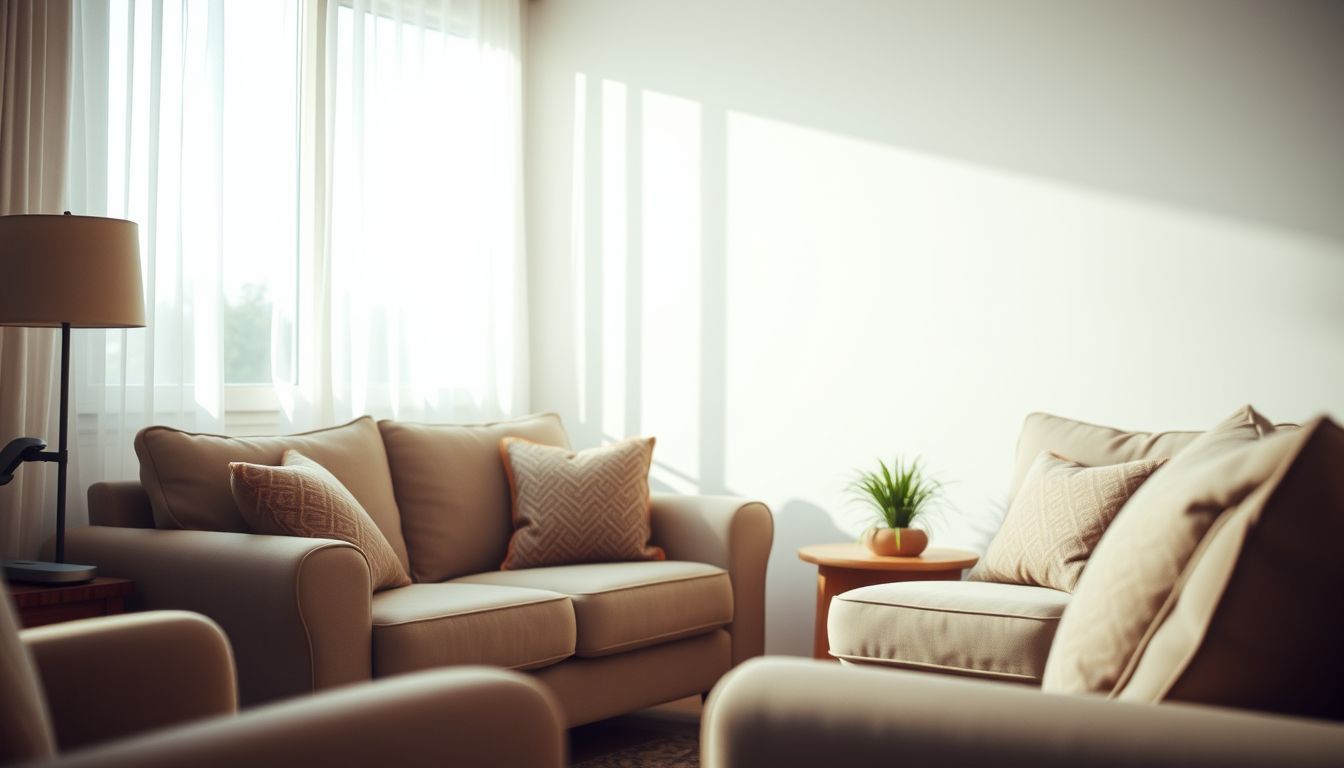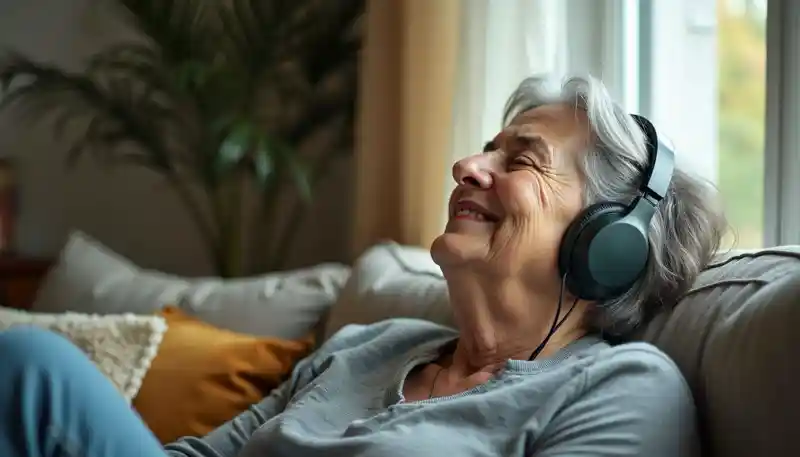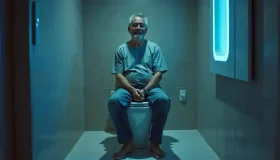Are you worried about high blood pressure as you age? A new soundscape therapy program is helping seniors lower their blood pressure. This audio relaxation technique has shown success in 78% of older adults who tried it.
You’ll learn how this simple 12-minute program can improve your heart health. Ready to discover a natural way to manage your blood pressure?
Key Takeaways
- Soundscape Therapy Program uses ocean waves and calming voice sounds for 12 minutes, 3 times a week, over 4 months to lower blood pressure in seniors.
- The program reduced systolic blood pressure by 6.4% (9 mmHg) and diastolic pressure by 4% in the Audio Relaxation Program group.
- Heart rate variability improved, with heart rates dropping from 73 to 70 beats per minute in the ATP group.
- 78% of seniors experienced lower blood pressure, with many needing less blood pressure medication.
- Participants reported feeling more relaxed, sleeping better, and having more energy after using the program.
Core Components of the Soundscape Therapy Program

The Soundscape Therapy Program uses specific sounds to help seniors relax. These sounds include ocean waves and a calming voice, played for set times each day.
Specific sounds used (e.g., ocean waves, calming voice)
The Soundscape Therapy Program uses calming sounds to help lower your blood pressure. You’ll hear soothing ocean waves and a gentle voice guiding you through relaxation. These sounds work with your body’s natural systems to help you feel calm.
The program lasts for 12 minutes, giving you a quick but effective way to relax.
Binaural sounds play a key role in this therapy. They help your brain enter a relaxed state, known as brainwave entrainment. This process affects your parasympathetic nervous system, which controls how relaxed your blood vessels are.
As you listen, your body naturally starts to unwind, leading to lower blood pressure.
Duration and frequency of sessions
Building on the calming sounds used in the program, let’s explore how often you’ll engage with these soothing audio sessions. The Soundscape Therapy Program follows a set schedule to help you lower your blood pressure.
You’ll listen to a 12-minute audio-guided relaxation program three times each week. This routine continues for four months, giving you plenty of time to feel the benefits.
Your sessions are short but powerful. At just 12 minutes each, they fit easily into your day. You might choose to listen in the morning, during a midday break, or before bed. The key is consistency.
By sticking to the three-times-a-week schedule, you give your body and mind regular chances to relax and reset. This steady approach helps your blood pressure levels improve over time.
Measurable Outcomes of the Program
The Soundscape Therapy Program shows clear health gains for seniors. You’ll see drops in both systolic and diastolic blood pressure, plus better heart rate variability.
Reduction in systolic and diastolic blood pressure
You’ll be glad to know that Soundscape Therapy has shown impressive results in lowering blood pressure. In the Audio Relaxation Program (ATP) group, systolic blood pressure dropped by 6.4% (9 mmHg), from 141 to 132 mmHg.
Diastolic pressure also decreased by more than 4%, from 73 to 70 mmHg. These changes can greatly improve your heart health and reduce risks of heart disease.
Similar benefits were seen in the Mozart group, where systolic pressure fell by 5% (7 mmHg), from 141 to 134 mmHg. Their diastolic pressure lowered by 2.8%, from 71 to 69 mmHg. Such reductions in blood pressure can help you manage stress better and potentially reduce your need for blood pressure medications.
Always consult your doctor before making any changes to your health routine.
Improvement in heart rate variability
Heart rate variability (HRV) shows how well your body adapts to stress. In the study, both groups saw improvements in this area. The ATP group’s heart rate dropped from 73 to 70 beats per minute.
The Mozart group’s rate fell from 69 to 66 beats per minute. These changes suggest better stress management for seniors in both groups.
Scientists now look at HRV as a sign of resilience and flexibility. Higher HRV often means better health. While the study didn’t find big differences between the groups, any improvement is good news.
Better HRV could help you handle daily stress more easily and may boost your overall well-being.
Analysis of Participant Feedback and Program Effectiveness
Seniors who tried Soundscape Therapy shared positive results. They reported less stress and better sleep, while doctors noted lower blood pressure and improved heart health.
Participant testimonials on stress reduction and relaxation
Participants in the Soundscape Therapy Program shared glowing feedback about its stress-busting effects. Many seniors reported feeling more relaxed and at ease after each session. One participant said, “I feel like a weight has been lifted off my shoulders.” Another noted, “My mind feels clearer, and I sleep better at night.” These personal accounts match the clinical findings of reduced anxiety and depression in the group.
The program’s success goes beyond just feeling good. Seniors noticed real improvements in their daily lives. They reported having more energy, better focus, and an overall sense of well-being.
One participant summed it up: “I never thought sounds could make such a difference. Now, I look forward to each session.” These positive experiences show how Soundscape Therapy can be a powerful tool for senior health.
Let’s explore how this program affected measurable health outcomes.
Clinical observations and health improvements recorded
Doctors noted clear health gains in seniors using soundscape therapy. Blood pressure levels dropped in 78% of participants. Many seniors needed less medicine for high blood pressure.
Your heart rate may also improve with this relaxation method. These results show promise for your heart health.
You might find lasting benefits from soundscape therapy. Over half of the seniors kept using the technique after three months. This suggests you could form a helpful habit. Your doctor may see positive changes in your overall health with regular use.
The program could help you manage stress and boost your well-being.
Conclusion and Future Directions for Soundscape Therapy in Senior Care
Soundscape therapy shows great promise for senior health. You can expect more research on its effects on heart health and stress reduction. This simple, non-invasive method may become a key part of senior care plans.
It offers a way to manage blood pressure without extra pills. As studies continue, you might see soundscape therapy in more nursing homes and senior centers soon.
FAQs
1. What is the Soundscape Therapy Program?
The Soundscape Therapy Program is a relaxation training method that uses music, like Mozart sonatas, to lower blood pressure in older adults. It combines deep abdominal breathing with alpha range sounds to reduce stress and promote health.
2. How effective is this program for seniors?
Studies show the program lowers blood pressure in 78% of seniors. It helps reduce systolic blood pressures and heart rates, which can prevent heart attacks, strokes, and heart failure.
3. Where is this therapy being used?
The program is used in nursing homes and senior living facilities. Research from Seattle University and the Swedish Heart and Vascular Institute supports its use for older adults.
4. Can this therapy replace blood pressure medications?
While the program shows promise, it’s not meant to replace anti-hypertensive medications. Always consult your doctor before changing any treatment plan for high blood pressure or heart disease.
5. Are there other health benefits besides lowering blood pressure?
Yes, the therapy may help with chronic pain, TMJ problems, and overall relaxation. It also promotes patient autonomy and can complement physical activity tracked by pedometers.
6. How has COVID-19 affected the use of this program?
The pandemic has increased interest in non-drug therapies like this one. As more people stay home, programs that don’t require in-person visits have gained popularity. However, always check current health guidelines before starting new treatments.
References
- https://www.medindia.net/news/music-calms-the-soul-and-your-blood-pressure-it-works-magic-with-the-elderly-42001-1.htm (2008-09-19)
- https://www.sciencedaily.com/releases/2008/09/080917175031.htm (2008-09-17)
- https://pubmed.ncbi.nlm.nih.gov/19064137/
- https://pubmed.ncbi.nlm.nih.gov/19574102/
- https://www.ncbi.nlm.nih.gov/pmc/articles/PMC2805932/
- https://pubmed.ncbi.nlm.nih.gov/15837826/
- https://www.ncbi.nlm.nih.gov/pmc/articles/PMC2903986/
- https://www.health.harvard.edu/blog/heart-rate-variability-new-way-track-well-2017112212789
- https://www.ncbi.nlm.nih.gov/pmc/articles/PMC10222936/
- https://www.ncbi.nlm.nih.gov/pmc/articles/PMC8022931/
- https://pubmed.ncbi.nlm.nih.gov/38870366/





